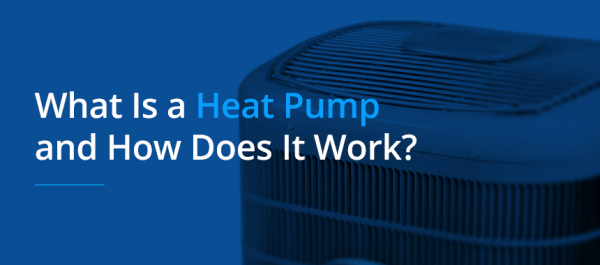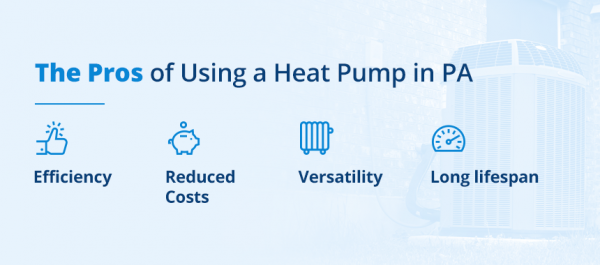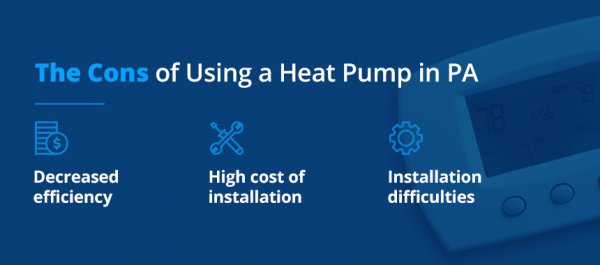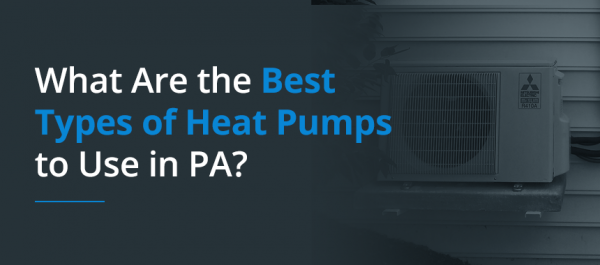
As a Pennsylvania home or business owner, you know that buying the right heating system is crucial. Unpredictable temperature swings throughout the year and below-freezing winter nights require increased care to protect you and your loved ones from the outside elements.
Heat pumps are a valid heating option for buildings throughout Central Pennsylvania. The pros of both air-source and geothermal heat pumps — even in chilly Northeastern winters — make these systems a popular choice for building owners.
Heating is one of the most significant costs associated with northern homes and offices, as space and water heating comprise 65 percent of Pennsylvanians’ average energy bills. When installed and used correctly, heat pumps can effectively lower these heating costs. But you’ll need the proper information to make an informed decision about whether to add a heat pump and what type of system you should install.
If you’re thinking of purchasing a heat pump but are hesitant to make such an important decision, our experts at Leggett, Inc., are here to help. With over 50 years of expertise, we can guide you with information concerning types of heat pumps, ideal heat pump temperatures and the effectiveness of purchasing a heat pump in PA.
Learn More About Our HVAC Services
What Is a Heat Pump and How Does It Work?

Technically speaking, a heat pump is a mechanical compression cycle refrigeration system that runs on electricity and works throughout the year to keep your building at an ideal temperature. Its name is misleading. A heat pump can actually both heat and cool your home or office. There are two main types of heat pumps — air-source and geothermal.
During an air-source heat pump installation, the pump is wired into your electrical system and powered just like any other electronic appliance. Two units are installed — an indoor air handler and an outdoor heat pump similar to a central air conditioning unit. These units work in unison to keep your building both cool and warm.
A compressor moves refrigerant that absorbs and releases heat as it travels between the heat pump and air handler. When it’s cold out, the heat pump extracts the outside heat energy and moves it indoors. In warm weather, it reverses directions and moves indoor heat to the outdoors, similar to an air conditioner.
In geothermal heat pump installation, long loops of pipes are buried underground or submerged in water, while a machine is placed either outdoors or inside your basement. The liquid-filled pipes then transfer heat energy from the constant temperature of the earth to the unit, which moves the heat to the rest of the building.
Most heating systems, such as gas or oil furnaces, create heat by burning fuel, thus using higher amounts of electricity. But heat pumps merely transport heat from the air or ground to the indoors. Even when it seems too cold outside to possibly heat your building, heat energy exists in the atmosphere until absolute zero. However, the amount of usable heat declines with dropping temperatures, making heat pumps more inefficient in colder weather.
At What Temperature Is a Heat Pump Not Effective?
Many sources disagree on the exact temperature at which standard-efficiency heat pumps lose their effectiveness. Generally, air-source heat pumps can handle climates of around 25 to 30 degrees Fahrenheit. But most traditional air-source heat pumps become inefficient at temperatures under 35.
You might wonder how a heat pump can effectively work in Pennsylvania if standard systems become inefficient above the freezing point. After all, winter temperatures throughout the state often reach far below freezing.
But rest assured, a heat pump can be effective, even in PA, when you use a high-efficiency source. Both air-source and geothermal heat pumps can save you energy and money throughout the year when correctly installed and used.
Standard air-source heat pumps work best in more mild temperatures. Until the emergence of recent technology, air-source pumps weren’t a popular choice for Northeastern buildings. But through the creation of high-efficiency heat pumps, you can now enjoy the benefits of an air-source heat pump even in Central PA.
A high-efficiency air-source heat pump can handle cold temperatures without losing too much efficiency. Recent technological advances allow these units to operate in freezing conditions. Some high-efficiency pumps can even function in temperatures below zero degrees. While a high-capacity system is more expensive initially than a standard unit, it’s the ideal option if you’re looking to use an air-source heat pump in freezing temperatures.
Another popular choice is a geothermal heat pump system, which can operate in any climate or temperature and take heat from the ground all year round. Geothermal heat pumps are gaining popularity in homes and businesses throughout the Northeast. Approximately 50,000 geothermal units are installed in the U.S. each year.
Hybrid heating systems are also an available option, especially if you already have an alternative heat system installed. Hybrid systems use a standard air-source heat pump during most of the year, when temperatures are milder. When the thermostat senses declining outdoor temperatures, the system switches over to a gas furnace system to heat your building until warmer weather returns. Each system operates during the time of year when it is most effective and when it will save you the most energy.
The Pros of Using a Heat Pump in PA

Heat pumps are gaining popularity throughout the U.S. as more people take advantage of their unique benefits. Both air-source and geothermal heat pumps can provide several advantages over other heating and cooling systems. Some of the most significant pros of using an air-source or geothermal heat pump in PA include:
- PRO: Efficiency – Traditional gas furnaces and boilers can run with up to 95 percent efficiency. But under the right weather conditions, air-source heat pumps can run with 300 percent efficiency, and geothermal heat pumps are up to 600 percent efficient — which means that these systems can transfer 300 and 600 percent more energy than they consume.
- PRO: Reduced energy consumption and costs – Today’s air-source heat pumps can reduce your energy consumption by about 50 percent as compared to furnaces or baseboard heaters, according to the U.S. Department of Energy. This reduction can significantly decrease your energy bill in the winter. Geothermal heat pumps, for example, can cut energy costs by up to 65 percent. A geothermal heat pump with an electric resistance backup only costs around $1,100 to operate per year, saving hundreds over furnaces and boiler systems.
- PRO: Versatility – Both air-source and geothermal heat pumps can be used for both heating and cooling, reducing the need for a traditional air conditioning system. Heat pumps are better dehumidifiers than air conditioners, so their versatility also offers increased comfort to your home or office.
- PRO: Long lifespan – Air-source heat pumps can last around 10 to 15 years, while geothermal pumps have a life expectancy of over 20 years for the pump itself and 50 years for the underground pipe network.

The Cons of Using a Heat Pump in PA

However, as with any big purchase, some negatives of both air-source and geothermal systems should be considered before you look further into the purchase and installation of your new heating system. Disadvantages of using a heat pump in PA include:
- CON: Decreased efficiency in extreme temperatures – A drawback of air-source heat pump use in PA that is often cited by experts is its limited range of use. Freezing temperatures prevent standard-efficiency heat pumps from running at maximum capacity. However, the emergence of high-efficiency air-source systems, as well as the increased popularity of geothermal and hybrid systems, mitigate this issue and allow consumers to purchase heat pumps in colder climates.
- CON: Possible higher cost of installation – Installing a new heating system is always an investment. While air-source heat pump installation costs about the same as the installation of a propane furnace, geothermal heat pump installation can more, making it a less budget-friendly initial investment. The costs of geothermal installation are paid off through energy efficiency over time. Consider the high-quality effects of a geothermal heat pump purchase before you commit to a decision.
- CON: Installation requirements – In addition to being a larger investment, geothermal heat pumps are slightly more difficult to position and should only be installed on certain property types. Horizontal geothermal systems, for example, require a large land area for installation, while vertical systems require a bedrock-free ground.
What Are the Best Types of Heat Pumps to Use in PA?

If you’re looking to install a heat pump system in your home or office building in PA, you need to be sure you’re choosing the right heating system that will reward you with energy savings and heightened overall efficiency. Three types of heat pumps — geothermal, air-source and ductless — provide the most significant benefits for heating your building.
1. Air-Source
Air-source heat pumps are the most common type of heat pump sold throughout the U.S. Air-source pump users appreciate their increased energy savings over traditional heating sources.
An air-source system can deliver up to three times more heat energy to a building than the electrical energy it consumes due to its unique ability to move the heat that’s already in the air rather than produce it through combustion. This efficiency decreases in colder temperatures as the pump works harder to extract heat from the outside air, but the system can still provide cost-efficiency, even in freezing temperatures.
High-efficiency air-source heat pumps can provide exceptional savings when used in Pennsylvanian buildings. Northeastern homes and businesses that use a heat pump as their primary heating system can save around $460 a year compared to those that use electric resistance heaters and $950 compared to those using oil systems.
2. Geothermal
Geothermal heat pumps — also known as ground-source heat pumps — take heat energy from the underground temperature of the earth rather than through the air. They provide the most significant money savings over time, as they deliver up to six times more heat energy than the electrical energy used for consumption.
Most geothermal heat pumps run on a closed-loop system, meaning that the pump recirculates water and antifreeze throughout underground plastic tubing into your building. The tubing system can be horizontal or vertical, depending on your land’s properties and the surrounding space available.
Geothermal systems are initially far more expensive than air-source heat pumps. Three investments will need to be considered before your purchase:
- The distribution or duct system
- The underground heating and cooling source
- The heat pump unit itself
Each is a pricey investment that requires careful installation performed by a professional.
Despite the initial costs, these pumps can work in nearly any climate and save money and energy for millions of people throughout the U.S. In fact, the additional costs of a geothermal pump installation can be paid off in about 15 years or less through its energy efficiency. A geothermal heat pump has a life expectancy of over 20 years, while the underground structure can last for up to 50, so this payback should occur well within the lifetime of the system.
3. Ductless
There are two types of air-source heat pumps — ducted and ductless systems. Ducted air-source heat pumps can consume extra energy, and they often provide less efficiency for heating or cooling an entire building. But ductless split systems offer high comfort and efficiency throughout your entire home or office.
Ductless split heat pumps are a type of air-source system that doesn’t require any ductwork to heat or cool a building. While a traditional air-source system uses ducts to distribute air and heat throughout a building, ductless systems connect two split units — the outside heat pump and inside air handlers — using a protected conduit. The conduit houses the refrigerant and suction tubing, power cable and condensation drain.
Ductless split units remain popular due to their flexibility for dehumidifying, heating and cooling individual rooms. Split systems can handle multiple air handling units at once, which allows each unit to focus on the needs of the individual room it was designed for.
Choose Leggett, Inc., for Your Heat Pump and Installation Needs

If you’re ready to purchase a heat pump for your home or office, turn to Leggett, Inc., to help. At Leggett, we supply and install high-efficiency heat pumps to home and business owners throughout Central PA.
As a local PA business, we understand the importance of keeping your building protected from inclement weather at the highest efficiency possible, which is why we only sell heat pumps tailored to fit Central PA’s unique climate. Our air-source pumps are 29 percent more efficient than the nearest high-efficiency competitor, and our geothermal systems are suited to any environment.
Since 1966, we’ve proudly serviced homes and businesses throughout Central PA. Our service area includes: Annville, Palmyra, Ono, Grantville, Middletown, New Kingston, Mifflintown, Port Royal, Liverpool, Duncannon, New Bloomfield, Elliottsburg, Shermansdale, Hummelstown, Marysville, Carlisle, Wellsville, Campbelltown, York Haven, Newport, Boiling Springs, Lewisberry, York Springs, Dover, Franklintown, Etters, Highspire, Grantham, Summerdale, Dillsburg, Loysville, Landisburg, Mexico, Ickesburg, Emigsville, Richfield, McAlisterville, Oakland Mills, Thompsontown, Millerstown, New Buffalo, Hershey, Halifax, Manchester, Newville, Plainfield, Peach Glen, Rheems, Mount Wolf, Elizabethtown, Bainbridge, Mount Holly Springs, Garners, Biglerville, New Oxford, Jonestown, Bendersville, Aspers, Mount Gretna, Abbottstown, Mount Joy, Rossville, Millersburg, East Berlin and all of Central PA.
To learn more about our heating services or to request a quote for your heat pump installation, contact our experts online today or call 717-737-4562.



